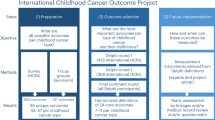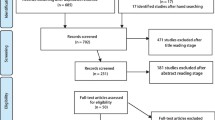Abstract
Purpose
Quality of life (QoL) has been increasingly emphasized in National Cancer Institute (NCI)-sponsored multisite clinical trials. Little is known about the outcomes of these trials in pediatric cancer. Objectives were to describe the proportion of Children’s Oncology Group (COG) QoL studies that successfully accrued subjects and were analyzed, presented or published.
Methods
We conducted a survey to describe outcomes of COG QoL studies. We included studies that contained at least one QoL assessment and were closed to patient accrual at the time of survey dissemination. Respondents were the investigators most responsible for the QoL aim.
Results
Sixteen studies were included; response rate was 100 %. Nine (56 %) studies were embedded into a cancer treatment trial. Only 3 (19 %) studies accrued their intended sample size. Seven (44 %) studies were analyzed, 9 (56 %) were presented, and 6 (38 %) were published.
Conclusions
NCI-sponsored pediatric QoL studies have high rates of failure to accrue. Many were not analyzed or disseminated. Using these data, strategies have been implemented to improve conduct in future trials. Monitoring of QoL studies is important to maximize the chances of study success.
Similar content being viewed by others
References
Adamson, P. C. (2013). The Children’s Oncology Group’s 2013 five year blueprint for research. Pediatric Blood and Cancer, 60, 955–956.
Ward, E., Desantis, C., Robbins, A., et al. (2014). Childhood and adolescent cancer statistics, 2014. CA: A Cancer Journal for Clinicians, 64, 83–103.
Linabery, A. M., & Ross, J. A. (2008). Childhood and adolescent cancer survival in the US by race and ethnicity for the diagnostic period 1975–1999. Cancer, 113, 2575–2596.
Tomlinson, D., Bartels, U., Gammon, J., et al. (2011). Chemotherapy versus supportive care alone in pediatric palliative care for cancer: Comparing the preferences of parents and health care professionals. CMAJ, 183, E1252–E1258.
The WHOQOL Group. (1998). The world health organization quality of Life assessment (WHOQOL). Development and psychometric properties. Social Science and Medicine, 46, 1569–1585.
Vanhoff, D., Hesser, T., Kelly, K. P., et al. (2013). Facilitating accrual to cancer control and supportive care trials: The clinical research associate perspective. BMC Medical Research Methodology, 13, 154.
Schoot, R. A., van Ommen, C. H., Caron, H. N., et al. (2012). Accrual in supportive care trials in pediatric oncology, a challenge! Supportive Care in Cancer, 20, 3149–3153.
Heiney, S.P., Adams, S.A., Cunningham, J.E., et al. (2006). Subject recruitment for cancer control studies in an adverse environment. Cancer Nursing 29: 291–299; quiz 300–291.
Palesh, O., Demark-Wahnefried, W., Mustian, K., et al. (2011). Conducting cancer control and survivorship research via cooperative groups: A report from the American Society of Preventive Oncology. Cancer Epidemiol Biomarkers Prev, 20, 1050–1055.
Carter, A., Landier, W., Schad, A., et al. (2008). Successful coordination and execution of nontherapeutic studies in a cooperative group setting: Lessons learned from Children’s Oncology Group studies. Cancer Epidemiol Biomarkers Prev, 17, 1665–1673.
Johnston, D. L., Nagarajan, R., Caparas, M., et al. (2013). Reasons for non-completion of health related quality of life evaluations in pediatric acute myeloid leukemia: A report from the Children’s Oncology Group. PLoS ONE, 8, e74549.
Acknowledgments
The authors would like to thank David Freyer, Brad Pollack, Ann O’Mara and Pam Hinds for their assistance in identifying eligible studies. This study was funded by Children’s Oncology Group Grant CA 98543 (Chair’s Grant), CA 180886 (NCTN Operation Center Grant), CA 98413 (Statistics and Data Center Grant) and CA 180899 (NCTN Statistics and Data Center Grant). The funders had no role in study design, data collection and analysis, decision to publish or preparation of the manuscript.
Author information
Authors and Affiliations
Corresponding author
Appendix
Rights and permissions
About this article
Cite this article
Whitlow, P.G., Caparas, M., Cullen, P. et al. Strategies to improve success of pediatric cancer cooperative group quality of life studies: a report from the Children’s Oncology Group. Qual Life Res 24, 1297–1301 (2015). https://doi.org/10.1007/s11136-014-0855-9
Accepted:
Published:
Issue Date:
DOI: https://doi.org/10.1007/s11136-014-0855-9




